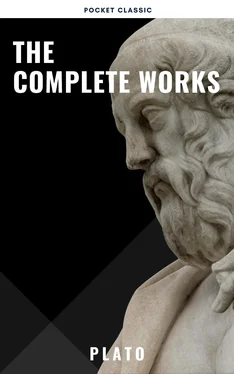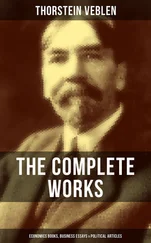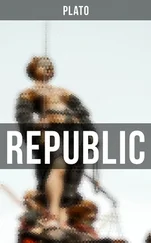SOCRATES: But surely we acknowledged that there were no teachers of virtue?
MENO: Yes.
SOCRATES: Then we acknowledged that it was not taught, and was not wisdom?
MENO: Certainly.
SOCRATES: And yet we admitted that it was a good?
MENO: Yes.
SOCRATES: And the right guide is useful and good?
MENO: Certainly.
SOCRATES: And the only right guides are knowledge and true opinion—these are the guides of man; for things which happen by chance are not under the guidance of man: but the guides of man are true opinion and knowledge.
MENO: I think so too.
SOCRATES: But if virtue is not taught, neither is virtue knowledge.
MENO: Clearly not.
SOCRATES: Then of two good and useful things, one, which is knowledge, has been set aside, and cannot be supposed to be our guide in political life.
MENO: I think not.
SOCRATES: And therefore not by any wisdom, and not because they were wise, did Themistocles and those others of whom Anytus spoke govern states. This was the reason why they were unable to make others like themselves—because their virtue was not grounded on knowledge.
MENO: That is probably true, Socrates.
SOCRATES: But if not by knowledge, the only alternative which remains is that statesmen must have guided states by right opinion, which is in politics what divination is in religion; for diviners and also prophets say many things truly, but they know not what they say.
MENO: So I believe.
SOCRATES: And may we not, Meno, truly call those men ‘divine’ who, having no understanding, yet succeed in many a grand deed and word?
MENO: Certainly.
SOCRATES: Then we shall also be right in calling divine those whom we were just now speaking of as diviners and prophets, including the whole tribe of poets. Yes, and statesmen above all may be said to be divine and illumined, being inspired and possessed of God, in which condition they say many grand things, not knowing what they say.
MENO: Yes.
SOCRATES: And the women too, Meno, call good men divine—do they not? and the Spartans, when they praise a good man, say ‘that he is a divine man.’
MENO: And I think, Socrates, that they are right; although very likely our friend Anytus may take offence at the word.
SOCRATES: I do not care; as for Anytus, there will be another opportunity of talking with him. To sum up our enquiry—the result seems to be, if we are at all right in our view, that virtue is neither natural nor acquired, but an instinct given by God to the virtuous. Nor is the instinct accompanied by reason, unless there may be supposed to be among statesmen some one who is capable of educating statesmen. And if there be such an one, he may be said to be among the living what Homer says that Tiresias was among the dead, ‘he alone has understanding; but the rest are flitting shades’; and he and his virtue in like manner will be a reality among shadows.
MENO: That is excellent, Socrates.
SOCRATES: Then, Meno, the conclusion is that virtue comes to the virtuous by the gift of God. But we shall never know the certain truth until, before asking how virtue is given, we enquire into the actual nature of virtue. I fear that I must go away, but do you, now that you are persuaded yourself, persuade our friend Anytus. And do not let him be so exasperated; if you can conciliate him, you will have done good service to the Athenian people.
Part 2 Middle Dialogues
PERSONS OF THE DIALOGUE:Socrates, who is the narrator of the Dialogue. Crito, Cleinias, Euthydemus, Dionysodorus, Ctesippus.
THE SETTING:The Lyceum.
CRITO: Who was the person, Socrates, with whom you were talking yesterday at the Lyceum? There was such a crowd around you that I could not get within hearing, but I caught a sight of him over their heads, and I made out, as I thought, that he was a stranger with whom you were talking: who was he?
SOCRATES: There were two, Crito; which of them do you mean?
CRITO: The one whom I mean was seated second from you on the right-hand side. In the middle was Cleinias the young son of Axiochus, who has wonderfully grown; he is only about the age of my own Critobulus, but he is much forwarder and very good-looking: the other is thin and looks younger than he is.
SOCRATES: He whom you mean, Crito, is Euthydemus; and on my left hand there was his brother Dionysodorus, who also took part in the conversation.
CRITO: Neither of them are known to me, Socrates; they are a new importation of Sophists, as I should imagine. Of what country are they, and what is their line of wisdom?
SOCRATES: As to their origin, I believe that they are natives of this part of the world, and have migrated from Chios to Thurii; they were driven out of Thurii, and have been living for many years past in these regions. As to their wisdom, about which you ask, Crito, they are wonderful— consummate! I never knew what the true pancratiast was before; they are simply made up of fighting, not like the two Acarnanian brothers who fight with their bodies only, but this pair of heroes, besides being perfect in the use of their bodies, are invincible in every sort of warfare; for they are capital at fighting in armour, and will teach the art to any one who pays them; and also they are most skilful in legal warfare; they will plead themselves and teach others to speak and to compose speeches which will have an effect upon the courts. And this was only the beginning of their wisdom, but they have at last carried out the pancratiastic art to the very end, and have mastered the only mode of fighting which had been hitherto neglected by them; and now no one dares even to stand up against them: such is their skill in the war of words, that they can refute any proposition whether true or false. Now I am thinking, Crito, of placing myself in their hands; for they say that in a short time they can impart their skill to any one.
CRITO: But, Socrates, are you not too old? there may be reason to fear that.
SOCRATES: Certainly not, Crito; as I will prove to you, for I have the consolation of knowing that they began this art of disputation which I covet, quite, as I may say, in old age; last year, or the year before, they had none of their new wisdom. I am only apprehensive that I may bring the two strangers into disrepute, as I have done Connus the son of Metrobius, the harp-player, who is still my music-master; for when the boys who go to him see me going with them, they laugh at me and call him grandpapa’s master. Now I should not like the strangers to experience similar treatment; the fear of ridicule may make them unwilling to receive me; and therefore, Crito, I shall try and persuade some old men to accompany me to them, as I persuaded them to go with me to Connus, and I hope that you will make one: and perhaps we had better take your sons as a bait; they will want to have them as pupils, and for the sake of them willing to receive us.
CRITO: I see no objection, Socrates, if you like; but first I wish that you would give me a description of their wisdom, that I may know beforehand what we are going to learn.
SOCRATES: In less than no time you shall hear; for I cannot say that I did not attend—I paid great attention to them, and I remember and will endeavour to repeat the whole story. Providentially I was sitting alone in the dressing-room of the Lyceum where you saw me, and was about to depart; when I was getting up I recognized the familiar divine sign: so I sat down again, and in a little while the two brothers Euthydemus and Dionysodorus came in, and several others with them, whom I believe to be their disciples, and they walked about in the covered court; they had not taken more than two or three turns when Cleinias entered, who, as you truly say, is very much improved: he was followed by a host of lovers, one of whom was Ctesippus the Paeanian, a well-bred youth, but also having the wildness of youth. Cleinias saw me from the entrance as I was sitting alone, and at once came and sat down on the right hand of me, as you describe; and Dionysodorus and Euthydemus, when they saw him, at first stopped and talked with one another, now and then glancing at us, for I particularly watched them; and then Euthydemus came and sat down by the youth, and the other by me on the left hand; the rest anywhere. I saluted the brothers, whom I had not seen for a long time; and then I said to Cleinias: Here are two wise men, Euthydemus and Dionysodorus, Cleinias, wise not in a small but in a large way of wisdom, for they know all about war,—all that a good general ought to know about the array and command of an army, and the whole art of fighting in armour: and they know about law too, and can teach a man how to use the weapons of the courts when he is injured.
Читать дальше












